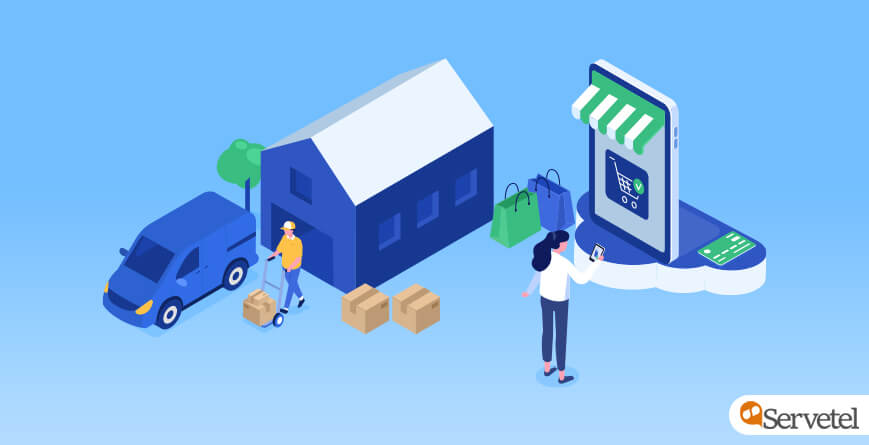(Update: This blog was originally published on 22nd August 2017 and was last updated on 20th May 2020 for comprehensiveness and accuracy.)
More and more businesses throughout the world are outsourcing logistics, i.e. opting for third party logistics (3PL). Given the complicated architecture of supply chains and related operations, it is only logical for businesses to hire logistics service providers.
In India alone, analysts suggest a growth of 8.36% in the 4 year period from 2018-2022 in the 3PL industry. Such growth is indicative of the immense potential of the industry.
However, the 3PL business calls for a robust communication system, which facilitates operational efficiency, thus cutting down on operational costs. In an industry where the mantra ‘time is money’ is more factual than metaphorical, operational efficiency and competitive margins are a necessity to sustain in the market.
For most logistics service providers, cloud telephony solution has emerged to be the armament of choice . Thanks to these solutions, companies can now drive down frequent incurring costs thus creating a sustainable model, allowing them to reduce the overall operational costs and increase efficiency and profitability.
Before we learn and discuss various cloud telephony technologies driving the logistics industry of the day, let us get a brief idea of the traditional business model and methods earlier used on the field.
Pen and paper methods of creating and maintaining a physical copy for transactions was the norm. Though some companies still use this method to keep a track of their deliveries, the problems associated with the same are pertinent.
Misplacing files, wrong input and other human errors were common. The delivery agent updates the order status summary but only after finishing, the day’s work. The same is collated and forwarded to all stakeholders. This can lead to delays and often inaccuracies.
Modern solutions involve the use of smart devices like smartphones or tablets. Delivery agents use the custom-built app installed in these devices to track and complete their deliveries.
Once the delivery is complete, the same application is used to update and share the status with all stakeholders. The solution offers a great alternative to the taxing pen and paper method, however fails to address some operational issues, like:
Unreliable Internet Connection
The prerequisite for the custom-built app is a stable internet connection. However, last mile data connectivity is still a challenge, especially in a developing country like India.
Hence, improper internet connectivity can make this solution obsolete, doing more harm than good. This inefficiency can further result in delays and inaccuracy causing disruption in the logistics cycle.
Dispute Resolution Issues
In case of issues pertaining to misplaced deliveries, prolonged delays, incorrect status updates, etc., most logistics service providers either do not have a contingency in place or the lead-time to find out the inconsistency is very long and strenuous for both the business and customer.
These issues and related delays are caused due to lack of proper communication infrastructure that allows real-time updates throughout the supply chain with or without internet connectivity.
Errors in Data Entry
Logistics industry calls for near perfect data entry to ensure proper functioning. Relying on timely and accurate data, the business cannot afford errors.
However, there is no infrastructure in place to facilitate the same for its employees and most importantly for its delivery agents. There is an urgent need to adopt a more convenient method for agents on the go.
These are only some of the many challenges faced by 3PLs. Other challenges faced by 3PLs are order delivery status clarity, lack of communication between the customer and delivery personnel, which leads to high reimbursement costs and in worse cases, increase in COD orders returns.
Cloud Telephony Solutions Change the Game!
Cloud based communications add another dimension to the entire supply chain. It offers a plethora of benefits for 3PL companies like real-time tracking, fastened resolution time among others.
Let us now understand in detail how cloud telephony solutions can help and enhance supply chain efficiency for logistics service providers.
Real-Time Tracking
Using cloud telephony solutions like automated IVR, agents can readily make a call, which automatically updates the delivery status based on the option so selected.
Integrating this service with the company’s CRM system, which can facilitate that all stakeholders get instant notifications. Cloud telephony technology facilitate these advances without relying on internet-connectivity, thus ensuring true last-mile integration.
Easy Monitoring
Cloud telephony solutions allow in time monitoring of all customer-facing calls by recording and analyzing the same. Using analytics tools managers can now easily understand and intervene in case of any discrepancies.
These tools thus, allow businesses to develop and deploy strategic processes, which help avoid supply chain disruptions due to lack of proper communication.
Speedy Redressal
By providing real-time updates across platforms and robust communication structure, cloud telephony solutions help in efficient inventory management and consistent reports throughout the supply chain. Thus, any discrepancies are quickly found and timely addressed; thereby, speeding up issue redressal to a great extent.
Convenient Communication Channel
Logistics service providers endure heavy losses due to failure delivering Cash on Delivery (COD) orders. At times customers are not available and sometimes deny to accept and pay for the products.
Delivery agents therefore call customers before delivering the order. This is called ‘confirmation before delivery’ and helps to ensure the authenticity and availability of the customer.
Cloud telephony solution eliminates the need of added expenditure, allowing delivery agents to make work calls using as many extensions as needed.
Top to Bottom Optimization
Cloud telephony solutions allow the logistics companies to update the order statuses in real-time and grant them the ability to review and optimize the efficiency of other processes like distribution, supply chain, procurement, payroll, etc.
In addition, SMS alerts help notify customers and other stakeholders of the current status. These solutions make consumer data readily available, along with work suites to facilitate on-the go working.
In Conclusion
Cloud telephony solutions can easily revamp the entire 3PL landscape and provide solutions for some of the most beaming challenges faced today. IVR, SMS alerts among others can facilitate real time updates and avoid unnecessary disruption due to improper communication channels.
Companies using cloud telephony services have already reported success and benefits. 3PL businesses have described a significant 18% increase in on-time deliveries, in addition to a 30% decrease in losses due to non acceptance of COD orders.
A direct result of these advances along with on time deliveries and a reduction in dispute resolution time is a sharp drop in customer complaints.
Cloud technology thus offers tailor-made solutions for the logistics industry. With economical packages and convenient setup, It is a must for 3PL companies. It is a step in the right direction of revolutionizing one’s company by improving overall operational efficiency and saving time and cost at the same time.
Make your business super efficient with Servetel’ cloud technology. Ring us at 1800-120-4132.

















